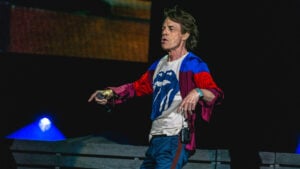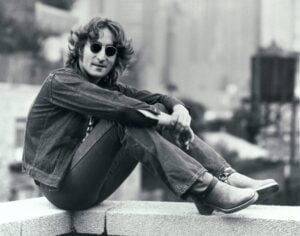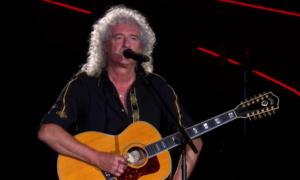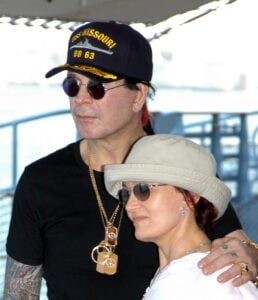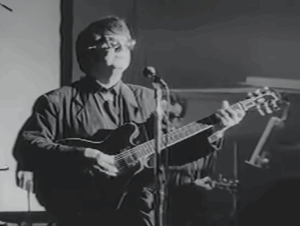49 Rock Replacement Singers And Who They Replaced
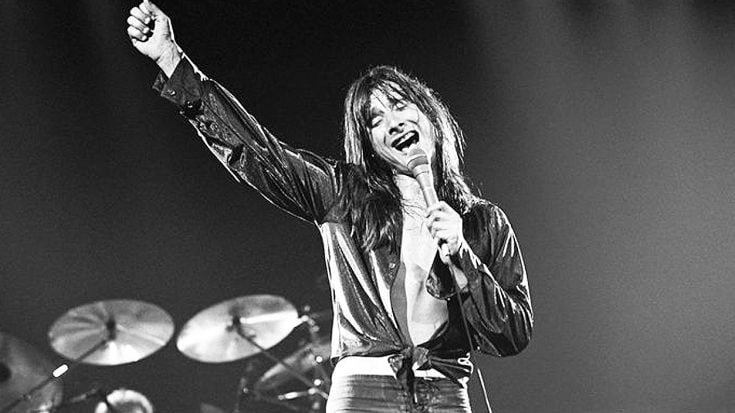
Image via tampabay.com
Rock history is full of legendary frontmen, but what happens when they leave? The focus shifts to their replacements, who face the challenge of filling huge shoes while also having the chance to bring fresh creativity. In this journey through rock’s dynamic evolution, we explore 49 notable frontman changes and the unique paths that followed.
1. Adam Lambert – Replaced: Paul Rodgers – Queen
Paul Rodgers was replaced by Adam Lambert in Queen, who contributed his own dynamic style and powerful vocals to the group. Despite taking a different approach than Rodgers, Lambert brought Queen’s sound back to life and won accolades from both reviewers and fans.
2. Arnel Pineda – Replaced: Jeff Scott Soto (who briefly filled in for Steve Augeri) – Journey
Jeff Scott Soto, who had temporarily stood in for Steve Augeri, was replaced by Arnel Pineda, who was found on YouTube. Pineda’s presence brought Journey a fresh surge of popularity, as his strong vocals and enthusiasm revitalized the band’s appeal.
3. Axl Rose – Replaced: Brian Johnson – AC/DC
When Brian Johnson encountered hearing problems, Axl Rose stepped in as AC/DC’s frontman for their Rock or Bust tour. Rose brought renewed energy and vocal strength, breathing new life into the legendary band.
4. Benoit David – Replaced: Jon Anderson – Yes
When Jon Anderson left Yes, Benoit David took over as the band’s lead vocalist. His distinct tone gave the group a new sound while emphasizing Yes’s versatility and development.
5. Blaze Bayley – Replaced: Bruce Dickinson – Iron Maiden
Bruce Dickinson’s renowned position made it challenging for Blaze Bayley to succeed him as Iron Maiden’s lead singer. Even if opinions about his time with the band were divided, it is still a unique chapter in Maiden’s career.
6. Bon Scott – Replaced: Dave Evans – AC/DC
The famous period of AC/DC began when Bon Scott replaced Dave Evans as the band’s lead singer. The band’s enormous popularity was made possible by his harsh, unpolished vocals, which helped define their sound.
7. Brian Howe – Replaced: Paul Rodgers – Bad Company
Following Paul Rodgers’ departure, Brian Howe joined Bad Company, adding to the band’s ’80s vibe. Although the shift caused controversy, Howe’s influence demonstrated the band’s adaptability to changing circumstances.
8. Brian Johnson – Replaced: Bon Scott – AC/DC
The huge vacuum left by Bon Scott’s death in AC/DC was filled by Brian Johnson. Johnson’s place in rock history was cemented by his unique and strong vocals, which helped the band reach new heights.
9. Bruce Dickinson – Replaced: Paul Di’Anno – Iron Maiden
When Bruce Dickinson replaced Paul Di’Anno as frontman of Iron Maiden, the band entered a legendary era. Dickinson’s operatic vocals were a defining characteristic of Maiden’s sound, propelling the group to international renown.
10. Chester Bennington – Replaced: Scott Weiland – Stone Temple Pilots
Following Scott Weiland’s departure, Chester Bennington took over as Stone Temple Pilots’ main vocalist. His tenure gave the band new vitality, and his diverse vocals gave their music a new depth.
11. David Coverdale – Replaced: Ian Gillan – Deep Purple
David Coverdale joined Deep Purple following Ian Gillan’s exit, and his unique singing style contributed to the band’s sound in the 1970s.
12. David Gilmour – Replaced: Syd Barrett – Pink Floyd
David Gilmour became a member of Pink Floyd as Syd Barrett’s mental state worsened. Gilmour’s outstanding guitar playing and compositions were crucial to the band’s development, helping them achieve worldwide renown with hits like “Dark Side of the Moon” and “Wish You Were Here.”
13. Doug Yule – Replaced: Lou Reed – Velvet Underground
When Lou Reed was replaced by Doug Yule, the Velvet Underground faced a sea change. Yule contributed to the band’s varied sound during this time of transition by bringing his own style to the group.
14. Gary Cherone – Replaced: Sammy Hagar – Van Halen
Sammy Hagar was replaced as Van Halen’s lead vocalist by Gary Cherone. Even though Van Halen’s time with the band was brief, it demonstrated his desire to try out various vocal approaches.
15. Graham Bonnet – Replaced: Ronnie James Dio – Rainbow
Ronnie James Dio was replaced as Rainbow’s lead vocalist by Graham Bonnet. The band gained new vitality from Bonnet’s strong and unique vocals, which also helped them maintain their prominence in the hard rock industry.
16. Ian Gillan – Replaced: Rod Evans – Deep Purple
Rod Evans was replaced as Deep Purple’s main singer by Ian Gillan. Deep Purple’s hard rock sound grew to be associated with Gillan’s dramatic stage presence and powerful, dynamic singing delivery.
17. J.D. Fortune – Replaced: Michael Hutchence – INXS
The difficult job of taking over as INXS’s lead singer from the legendary Michael Hutchence fell to J.D. Fortune. Fortune skillfully guided the group into a new age, preserving their legacy while continuing to create popular songs.
18. Jason Scheff – Replaced: Peter Cetera – Chicago
Following the departure of Peter Cetera, Jason Scheff joined Chicago. The band’s ongoing success in the pop and adult contemporary music arena may be attributed to Scheff’s soulful and silky vocals, which helped them develop their sound.
19. Jeff Gutt – Replaced: Chester Bennington – Stone Temple Pilots
After Chester Bennington’s death, Jeff Gutt took over as Stone Temple Pilots’ main vocalist. The band was able to adjust and keep making songs because of Gutt’s distinctive vocal style and imaginative vision.
20. Jimi Jamison – Replaced: Dave Bickler – Survivor
Jimi Jamison replaced Dave Bickler as Survivor’s lead singer. Jamison’s powerful and soulful vocals were a defining aspect of the band’s sound, contributing to their great commercial success in the 1980s.
21. Joe Lynn Turner – Replaced: Ian Gillan – Deep Purple
Ian Gillan was briefly replaced as Deep Purple’s frontman by Joe Lynn Turner. Turner’s strong and catchy vocals revealed a new side of the group and showed how adaptable they were in experimenting with other genres.
22. Joey Belladonna – Replaced: Neil Turbin – Anthrax
Neil Turbin was replaced as the lead vocalist for Anthrax by Joey Belladonna. During the band’s most successful period, Belladonna’s strong and adaptable vocals were a distinguishing characteristic of their sound and greatly influenced their legacy in thrash metal.
23. John Corabi – Replaced: Vince Neil – Motley Crue
Vince Neil was replaced as the lead vocalist for Motley Crue by John Corabi. Although the band experimented with a heavier, more alternative sound on their self-titled album with Corabi, it ultimately strayed from their established glam metal image and was a commercial failure.
24. John Payne – Replaced: John Wetton – Asia
John Payne joined Asia as lead vocalist following John Wetton’s departure. Payne’s smooth vocals and songwriting contributed to a shift in the band’s sound, incorporating more pop and AOR elements while maintaining their progressive rock roots.
25. Johnny Edwards – Replaced: Lou Gramm – Foreigner
Lou Gramm left Foreigner, and Johnny Edwards took over as vocalist. The band experimented with a more modern and AOR-focused sound during Edwards’ tenure, and they continued to be successful in the late 1980s and early 1990s.
26. Johnny Solinger – Replaced: Sebastian Bach – Skid Row
Sebastian Bach was replaced as the lead vocalist for Skid Row by Johnny Solinger. Even though it was difficult to replace Bach’s legendary role, Solinger contributed his own distinct sound to the group and performed and recorded with them for many years.
27. Johnny Van Zant – Replaced: Ronnie Van Zant – Lynyrd Skynyrd
Johnny Van Zant, brother of the late Ronnie Van Zant, assumed the role of lead vocalist in Lynyrd Skynyrd. He not only carried on the band’s musical legacy but also helped heal the wounds of the tragic plane crash that claimed his brother’s life.
28. Jon Davison – Replaced: Benoit David – Yes
Benoit David was replaced as lead vocalist by Jon Davison. Yes’s deep and sophisticated progressive rock compositions have been a perfect match for Davison’s strong and emotive voice.
29. Justin Hayward – Replaced: Denny Laine – The Moody Blues
Denny Laine was replaced with The Moody Blues by Justin Hayward. The band’s sound was greatly influenced by Hayward’s songwriting and unique guitar style, which helped them become a major force in progressive rock.
30. Kelly Hansen – Replaced: Lou Gramm – Foreigner
Lou Gramm was replaced as Foreigner’s main vocalist by Kelly Hansen. The band was able to continue touring and performing its old classics for a new generation of fans thanks to Hansen’s dynamic and strong vocals, which gave them new life.
31. Kevin Cronin – Replaced: Mike Murphy – REO Speedwagon
Mike Murphy was replaced as the lead vocalist for REO Speedwagon by Kevin Cronin. One of the most successful rock bands of the 1980s, Cronin’s lyrics, powerful vocals, and captivating stage presence catapulted the group to global fame.
32. Lawrence Gowan – Replaced: Dennis DeYoung – Styx
After Dennis DeYoung left Styx, Lawrence Gowan took over as the band’s lead vocalist and keyboardist. Gowan’s strong, expressive voice and piano dexterity gave the band new vitality and enabled them to tour and record well into the twenty-first century.
33. Mike Patton – Replaced: Chuck Mosley – Faith No More
Faith No More’s lead vocalist, Chuck Mosley, was replaced by Mike Patton. The band’s distinctive and experimental sound was mostly defined by Patton’s remarkable vocal range, which ranged from guttural growls to operatic highs.
34. Neil Finn – Replaced: Lindsey Buckingham – Fleetwood Mac
After Lindsey Buckingham left, Neil Finn became a guitarist and vocalist for Fleetwood Mac. Finn opened a new chapter in the band’s lengthy and remarkable history by bringing his own songwriting and musical tastes to the group, even though he wasn’t a direct replacement.
35. Paul Rodgers – Replaced: Freddie Mercury – Queen
When Freddie Mercury passed away, Queen’s rock hero Paul Rodgers joined the band. Although no one could ever fully replace Mercury, Rodgers’s bluesy rock influence and strong vocals made for a special and fruitful partnership.
36. Phil Anselmo – Replaced: Terry Glaze – Pantera
Terry Glaze was replaced by Phil Anselmo as the lead vocalist for Pantera. One of the most important bands of the 1990s, Pantera’s strong riffs and violent vocals by Anselmo became synonymous with the rise of groove metal.
37. Phil Collins – Replaced: Peter Gabriel – Genesis
After Peter Gabriel left Genesis, Phil Collins became the band’s lead vocalist. Genesis became one of the largest bands in the world in the 1980s thanks to Collins’ unique vocal and compositional skills, which helped them achieve unheard-of levels of financial success.
38. Ray Wilson – Replaced: Phil Collins – Genesis
Phil Collins was replaced as Genesis’ main vocalist by Ray Wilson. The band experimented with a more introspective and experimental sound during Wilson’s tenure, which produced the highly regarded albums “Calling All Stations” and “The Way We Walk.”
39. Ripper Owens Gregg Rolie – Replaced: Rob Halford – Judas Priest
Judas Priest’s lead vocalist, Rob Halford, was replaced by Tim “Ripper” Owens. During his tenure with the band, Owens kept Judas Priest’s metal flame burning strong and gave strong shows, despite the difficult task of following in Halford’s footsteps.
40. Robert Fleischman – Replaced: Gregg Rolie – Journey
For a brief period, Journey’s main vocalist Robert Fleischman replaced Gregg Rolie. Fleischman’s stay with the band served as a transitional period between the early years with Rolie and the ultimate entrance of Steve Perry, despite the briefness of his term.
41. Ronnie James Dio – Replaced: Ozzy Osbourne – Black Sabbath
Ozzy Osbourne was replaced as the lead vocalist for Black Sabbath by Ronnie James Dio. Together with his creative contributions, Dio’s strong and operatic vocals helped the band enter a new era and take their place as heavy metal pioneers.
42. Sammy Hagar – Replaced: David Lee Roth – Van Halen
Van Halen’s lead vocalist, David Lee Roth, was replaced by Sammy Hagar. Hagar gave the band’s sound a fresh boost of vitality and a more melodic focus, which led to several popular albums and hits including “Jump” and “Right Here, Right Now.”
43. Steve Augeri – Replaced: Steve Perry – Journey
After Steve Perry left Journey, Steve Augeri became the band’s lead vocalist. The band was able to continue performing and recording new music thanks to Augeri’s strong and unique voice, which helped them stay famous among fans of classic rock.
44. Steve Hogarth – Replaced: Fish – Marillion
Fish was replaced as the lead vocalist for Marillion by Steve Hogarth. Hogarth’s distinctive composition and vocals gave the band’s progressive rock sound a fresh perspective, which aided in their ongoing development and widespread praise.
45. Steve Perry – Replaced: Robert Fleischman – Journey
In place of Robert Fleischman, Steve Perry became the lead vocalist for Journey. Journey achieved unparalleled popularity thanks to Perry’s soaring vocals and captivating stage presence. They went on to produce several memorable hits and became one of the most successful rock bands of the 1980s.
46. Todd La Torre – Replaced: Geoff Tate – Queensryche
Geoff Tate was replaced as Queensryche’s main vocalist by Todd La Torre. La Torre’s strong and adaptable vocals revitalized the band’s music and drew in a new audience by adding a stronger edge and new vitality to their sound.
47. Tommy DeCarlo – Replaced: Brad Delp – Boston
The late Brad Delp was replaced as the band’s main vocalist by Tommy DeCarlo, a devoted Bostonian and tribute performer. The band has been able to continue performing and paying tribute to Boston’s legacy thanks to DeCarlo’s love of their music and his remarkable vocal skills.
48. Trevor Horn – Replaced: Jon Anderson – Yes
Yes’s lead vocalist, Trevor Horn, temporarily replaced Jon Anderson. Horn’s distinctive singing style and avant-garde production methods offered an intriguing and surprising chapter in Yes’s history, even though he wasn’t a permanent replacement.
49. William DuVall – Replaced: Layne Staley – Alice in Chains
Following the untimely death of Layne Staley, Alice in Chains added William DuVall as a co-lead vocalist with Jerry Cantrell. Alice in Chains has been able to continue making songs and touring, paying tribute to their history while pursuing a new direction thanks to DuVall’s strong voice and considerate attitude toward the band’s tradition.





